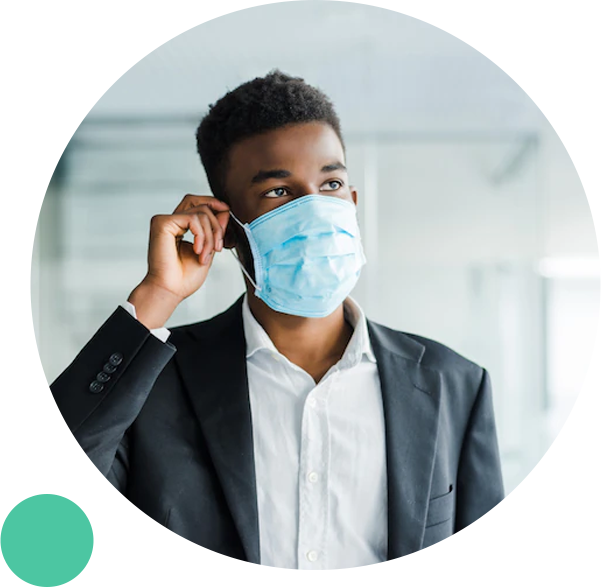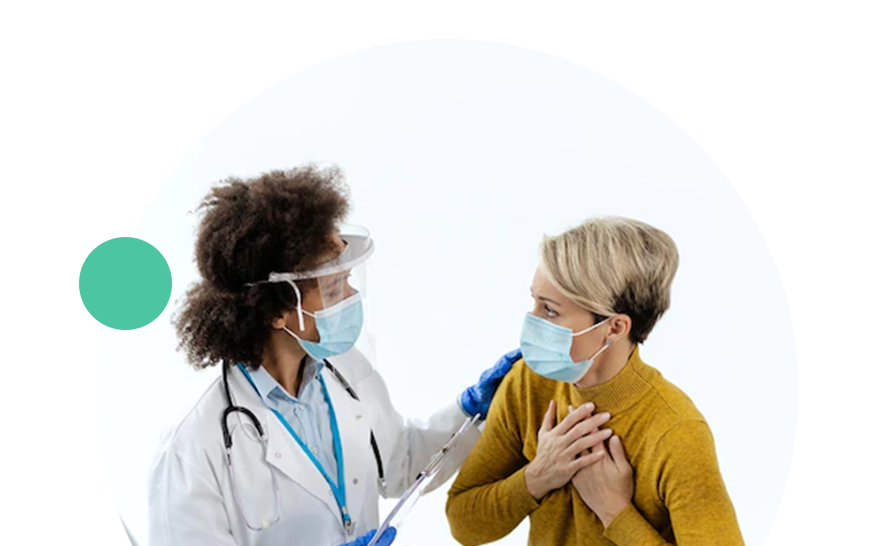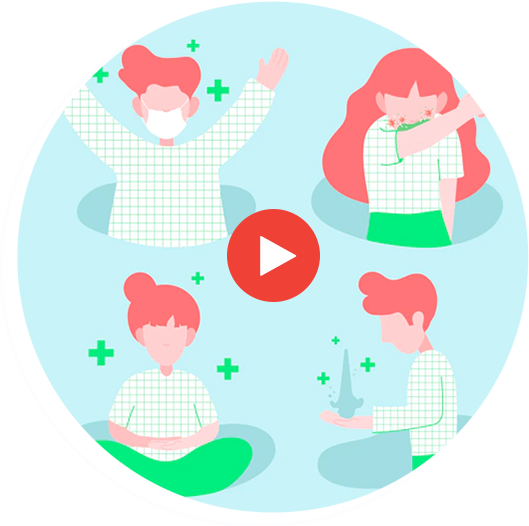
Consult an Online Doctor
For Treatment Of
Respiratory
Infection
Book an Appointment for Only

Respiratory infections are usually treated with antibiotics, but it is important to get prompt medical care from online doctors for respiratory infectionsto prevent complications from your illness.
TELMDCARE
What is
Respiratory Infection?
Respiratory infection is an inflammation of the lungs caused by a variety of infectious agents.
The most common are viruses, bacteria, and fungi. Infections can be spread through droplets from
coughing or sneezing, as well as through direct personal contact with someone who has been
infected.
Respiratory infections can be caused by bacteria or viruses. Bacteria that cause respiratory
infections include Streptococcus pneumoniae, Haemophilus influenzae, Staphylococcus aureus, and
other staphylococci and pneumococci. Viruses that cause respiratory infections include influenza
A (H1N1), influenza B, parainfluenza virus 1 or 2, and RSV.
Book an Appointment for Only
TELMDCARE
Is covered by many popular
insurance plans

TELMDCARE
Common Symptoms Of Respiratory Infection
Respiratory infection is a common infection of the respiratory tract, which includes the nose, throat, and bronchi. Here are some of its common symptoms:
If you experience any of the symptoms above, make sure to get in touch with our virtual doctors for respiratory infection treatment online.
Risk Factors of
Respiratory Infection
It is important to understand the risk factors of respiratory infection because it allows you to prevent them from happening.
Complications Of
The Condition
Respiratory infections can be very serious, and the symptoms can be difficult to distinguish from other common ailments.
TELMDCARE
Types To Respiratory Infections
The most common types of respiratory infections are the upper respiratory and lower respiratory infections, although there are others. The upper respiratory tract is where the nose meets the throat and it covers the pharynx and larynx. The lower respiratory tract is where air passes through the trachea and bronchi to enter your lungs. The following are some other common types of respiratory infections:
Upper Respiratory Tract Infection (URTI)
In URTI, viruses or bacteria infect your nasal passages and throat, causing you to have a sore throat, runny nose, and cough with mucus. URTIs can be treated with medications that kill viruses or bacteria. You may also need to take antibiotics if there are signs of bacterial infection such as fever and chills.
Lower Respiratory Tract Infection (LRTI)
In LRTI, viruses or bacteria infect your lungs by entering through tiny openings called cilia on their surface. These openings look like scales on grasshopper legs; these scales make cilia move air in and out of your lungs so that you can breathe normally.
TELMDCARE
As Seen On


TELMEDCARE
What we treat
We treat a variety of acute and chronic conditions and provide expert medical advice and guidance for our patients.
Read More
TELMDCARE
Causes Of
Respiratory Infection
The most common causes of respiratory infections are viruses. Viruses are either RNA or DNA viruses, which are small enough to be transmitted by airborne droplets. They can be spread from person to person through direct contact or indirect contacts like sharing a water bottle or sneeze-catching tissues.
Viruses can also cause respiratory tract infections when they infect the nasal passages, sinuses, and throat. This can occur through direct contact with infected people or animals as well as ingesting contaminated food or water. Most people will experience only mild symptoms but some may develop serious complications such as meningitis if they have a weakened immune system or if they have had chicken pox within the past two weeks.
If you’re experiencing any of the previously mentioned symptoms of a respiratory infection, you must visit your virtual doctor for respiratory infection immediately:

Medication services available 24/7 for adults and kids (3+)
Top quality, board-certified doctors
No insurance needed
Same-day prescriptions available*
*Prescriptions provided at doctor’s discretion.
TELMDCARE
When To See A Virtual Doctor For Respiratory Infections
If you are a patient with a respiratory infection, it’s important to seek medical treatment immediately. However, if you are too sick to go to the doctor's office, there are still ways to get the care you need. The first option is a virtual doctor for respiratory infection treatment. They can provide you with guidance and assistance from a remote location. They have access to all of your medical records and can give you advice on what steps need to be taken next. Virtual doctors work in many different areas of medicine, including surgery and psychiatry. They also use technology that allows them to connect with patients over video chat or phone, so they can provide care without ever seeing each other in person.


Treatment Options For
Respiratory Infections
Respiratory Infections are a common problem. They can affect anyone and cause long-term symptoms if left untreated. There are two main types of treatment for Respiratory Infections: Antibiotics and Antivirals.
If you're thinking about starting treatment for your respiratory infection, please contact our telemedicine doctor for respiratory infectiontoday!

Get Affordable Treatment For Respiratory Infection
Online At TelMDCare
At TelMDCare, we pride ourselves on helping you get affordable treatment for your respiratory infection online. Our team of experts will help you find the best treatment for your condition and provide you with a consultation that's tailored to your needs.
Our services include:
- Respiratory Infection Treatment (including medications and medication refills)
- Urgent Care Services
- Preventive Care Services
We can help you with any respiratory infection, including pneumonia and bronchitis, as well as other conditions like asthma.
So, what are you waiting for? Signup to book an appointment with ourvirtual doctors for respiratory infection treatment today.
TELMDCARE
FAQs For Respiratory Infection
The most common symptom of a respiratory infection is a stuffy or runny nose. Other signs include fever, chills, and fatigue. You may also experience coughing or chest congestion. If you have any of these symptoms for more than 3 days, see your online doctor for respiratoryinfectiondiagnosis and treatment.
Well, some upper respiratory infections are contagious and can spread from person to person, since they are caused by airborne bacteria and viruses that spread through the air. The most common types of these upper respiratory infections include colds, flu, and pneumonia.
Alcohol can make your symptoms worse. While some people can drink alcohol with few or no side effects, many people are sensitive to the effects of alcohol and may experience nausea, vomiting, headache, dizziness, drowsiness, or even an irregular heartbeat when they consume alcohol. If you have a respiratory infection and you’re thinking about drinking alcohol, it’s best not to do so if at all possible.
Yes! Everyone gets colds from time to time, but if you have several symptoms at once—like wheezing and difficulty breathing—you should see our telemedicine doctor for respiratory infection right away. The sooner you get treatment, the better chance you have at recovering quickly from your cold.



